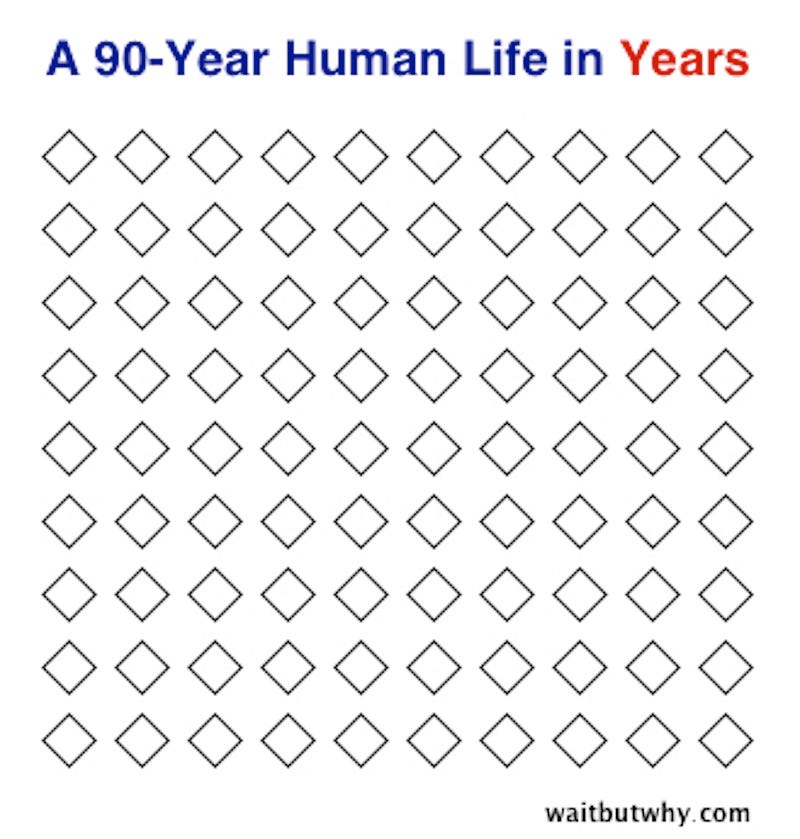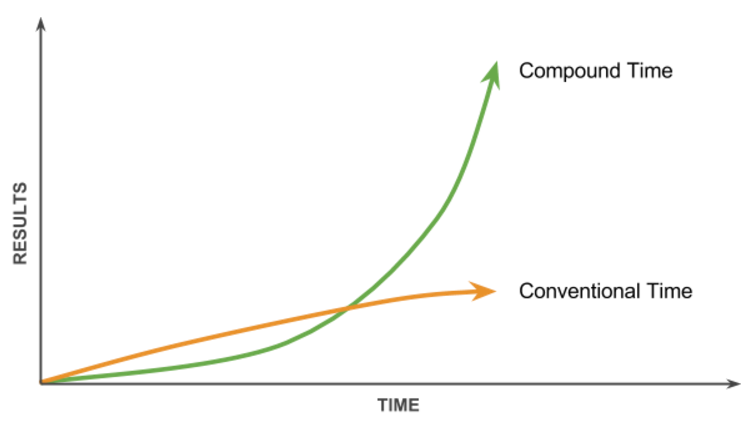If You Don’t Want To Regret Your Life 30 Years Later, Make This One Choice Right Now
Definition Of Hell: “On your last day on earth, the person you became will meet the person you could have become.” — Unknown
By the time you move out of your parents’ home, you’ve already spent 93% of the time that you will ever spend with them (if they live far away).
Conversely, as a parent, you will only see your kids a handful of times per year once they move out.
Our career is just 80,000 hours. There are only one or two things we can become truly world-class at if we go all out.
Tim Urban beautifully captures the shortness of life in this graphic:

Credit: The Tail End By Wait But Why
Each diamond is one year. One winter filled with sledding and building snowmen. One spring full of flowers. One summer for enjoying the beach. One fall’s worth of rainbow-colored leaves. One loop around the sun.
I remember being in high school and trying to fathom what it would be like to have kids. Now, I have a 7-year-old and 9-year-old running around the house. Fast-forward another 18 years, and I will be in the second half of my career and my kids will be out of the house. Maybe they’ll be reflecting on the shortness of life like I am now.
Every second, every minute, every hour, every day, every year is precious!
All of this brings us to the one ultimate and timeless question:
How do I live my life NOW so that I have no regrets on my deathbed?
One of the most brilliant and wise answers to this question that I’ve ever seen comes from a TED Talk delivered by world-renowned Harvard Professor called How Will You Measure Your Life?. The talk came after a time of intense personal reflection after Christensen had overcome the same type of cancer that had taken his father’s life. It particularly speaks to high achievers.
Here is the most inspiring part:
“I graduated from the MBA program at Harvard in 1979… When we came back for our 5th reunion, man, everyone was happy! Most of my classmates had married people who were much better looking… they were doing well in their career. But as we hit the 10th, and 15th, and 20th and then the 25th anniversaries, oh my gosh, my friends were coming back not happy with their lives. Very many of them had gotten divorced. Their spouses had remarried, and they were raising my classmates’ children on the other side of the country, alienated from them.
“And, I guarantee, that none of my classmates ever planned when they graduated from the business school to get divorced, and have children who hate their guts and are being raised by other [people]. And yet a very large proportion of my classmates implemented a strategy that they had never planned to do.
“And it turns out that the reason why they do that is the very same mechanism; that is the pursuit of achievement. Everyone here is driven to achieve. And when you have an extra ounce of energy or an extra 30 minutes of time, instinctively and unconsciously you’ll allocate it to whatever activities in your life give you the most immediate evidence of achievement. And our careers provide that most immediate evidence of achievement. We close a sale. We ship a product. We finish a presentation. We close a deal. We get promoted. We get paid. And our careers provide very tangible, immediate achievement.
“In contrast, investments in our families don’t pay off for a very long time. In fact, on a day-to-day basis, our children misbehave over and over again. And, it really isn’t until 20 years down the road that you can look at your children and be able to put your hands on your hips and say, “We raised great children!” But on a day-to-day basis, achievement isn’t at hand when we invest in relationships with our families, our children, and our spouses. And, as a consequence, people like you and I, who plan to have a happy life, because our families truly are the deepest source of happiness in our lives, find that though although that’s what we want, the way we invest our time, our energy, and talents causes us to implement a strategy we wouldn’t at all plan to pursue.”
Christensen then goes on to share how maximizing the short-term over the long-term relates to his widely known theory on disruptive innovation:
“The reason why successful companies fail is that they invest in things that provide the most immediate and tangible evidence of achievement. And the reason why they have such a short time horizon is that they are run by people like you and I [people focused on achievement].”
Christensen applies this theory to family and business disruption, and I’d make the case that it applies much more widely. Here are a few examples…
The leading causes of early death in the United States are linked to poor lifestyle. No one plans to die early, yet so many aren’t willing to eat healthy or exercise daily: things that are difficult to do in the short-term.
No one plans to go on unemployment or become obsolete in the workforce, yet so many aren’t willing to make deliberate learning a core part of their daily schedule, because it doesn’t provide an immediate sign of achievement.
No one plans to lead a life of chronic stress, but taking time for play or renewal can feel like a waste of time.
So, how do we change from thinking short-term to thinking long-term and reaping the benefits of the latter as a result?
The solution lies within understanding a key principle, compound time, something that successful people like Warren Buffett, Oprah, Ray Dalio, Einstein, and Thomas Edison use.
The Power Of Compound Time
In my article, Why Successful People Spend 10 Hours A Week On “Compound Time, I call activities that pay off in the long-term, but not always in the short-term compound time activities.
Examples of the compound time activities that I highlight include: reading, experimentation, walking, napping, journaling, and conversation partners. Interestingly, many of the most successful people throughout time have heavily invested in these compound time activities. Warren Buffett has spent 80% of his time throughout his career reading and thinking. Many of the most successful entrepreneurs follow the 5-hour rule and spend at least 5 hours per week learning. Einstein famously went back-and-forth between thinking through difficult physics problems and playing the violin. Einstein’s son described his father’s process: “[w]henever he felt that he had come to the end of the road or into a difficult situation in his work, he would take refuge in music, and that would usually resolve all his difficulties.”
Self-made billionaire Ray Dalio, the manager of the largest hedge fund in the world, beautifully explains the power of compound time in his new book, Principles:
By recognizing the higher-level consequences nature optimizes for, I’ve come to see that people who overweigh the first-order consequences of their decisions and ignore the effects of second- and subsequent-order consequences rarely reach their goals. This is because first-order consequences often have opposite desirabilities from second-order consequences, resulting in big mistakes in decision making. For example, the first-order consequences of exercise (pain and time spent) are commonly considered undesirable, while the second-order consequences (better health and more attractive appearance) are desirable. Similarly, food that tastes good is often bad for you and vice versa.
Quite often the first-order consequences are the temptations that cost us what we really want, and sometimes they are the barriers that stand in our way. It’s almost as though nature sorts us by throwing us trick choices that have both types of consequences and penalizing those who make their decisions on the basis of the first-order consequences alone.
By contrast, people who choose what they really want, and avoid the temptations and get over the pains that drive them away from what they really want, are much more likely to have successful lives.
Bottom line: by understanding and using the power of compound time, we can increase the odds of living a life without regret.
Start Investing In Compound Time Activities Now
Investing in compound time is difficult because it’s counterintuitive. We humans evolved to think short-term about food and sex. We didn’t evolve to think about the intricacies of how our decisions now could ripple 30 years into the future. Zat Rana captures the feeling: “ How we feel about something in the moment isn’t always the best predictor of how we’ll feel about it over a period. The thing that we’re focused on today and tomorrow may not be the thing that matters most in the [grand] scheme of things.”
In my experience, the best way to make time for compound time is to make it sacred and non-negotiable. Don’t use logic. There is ALWAYS going to be something that feels more urgent and important than deliberate learning, for example. It needs to be put in your calendar and become habitual.
To help you get started, I spent dozens of hours creating a free webinar on how to create a Learning Ritual…
Sign up for the compound time webinar here >>

| - | I teach people to learn HOW to learn |
| - | Bootstrapped million dollar social enterprises |
| - | Best-selling author |
| - | Contributor: Time, Fortune, and Harvard Business Review |
| - | Alum: Ernst & Young Entrepreneur Of The Year, Inc. 30 under 30, Businessweek 25 under 25 |
| - | Creator of the largest learning community in the world |
| - | Have read thousands of books |
Read more about me…



